2024中考英语试题研究 第二部分 专题一 第4讲 情态动词 (课件)(共20张PPT)
文档属性
| 名称 | 2024中考英语试题研究 第二部分 专题一 第4讲 情态动词 (课件)(共20张PPT) |  | |
| 格式 | pptx | ||
| 文件大小 | 396.6KB | ||
| 资源类型 | 教案 | ||
| 版本资源 | 通用版 | ||
| 科目 | 英语 | ||
| 更新时间 | 2023-12-19 20:34:36 | ||
图片预览

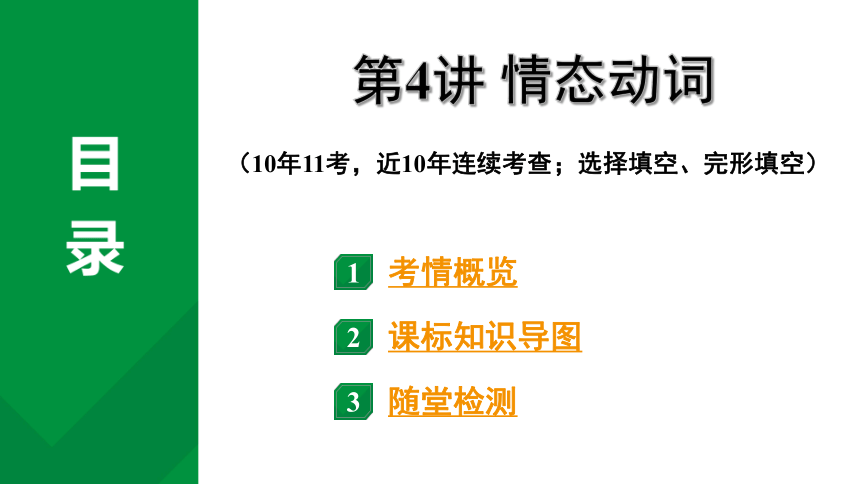
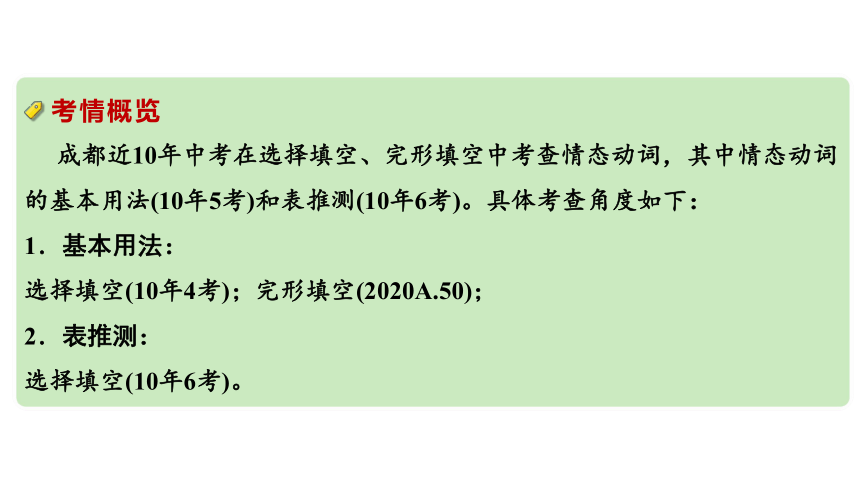
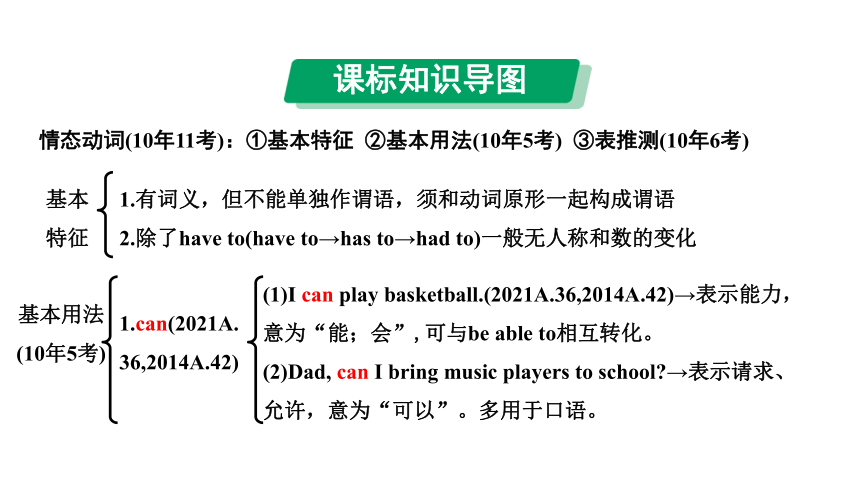
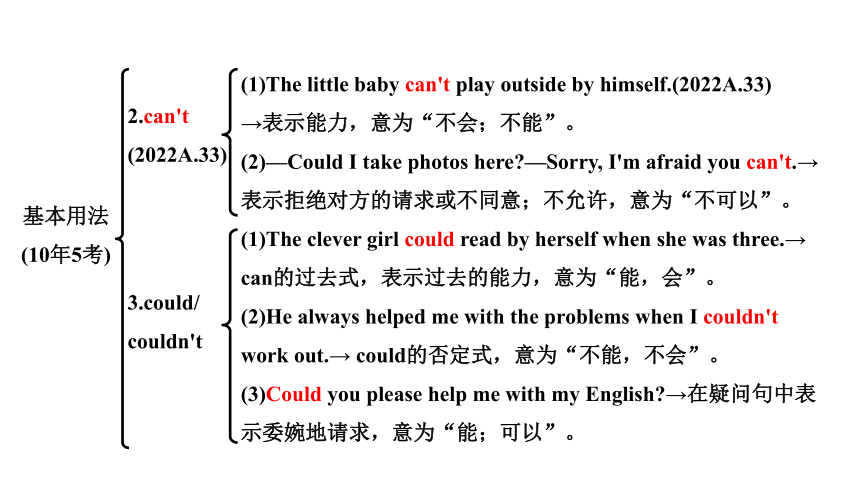
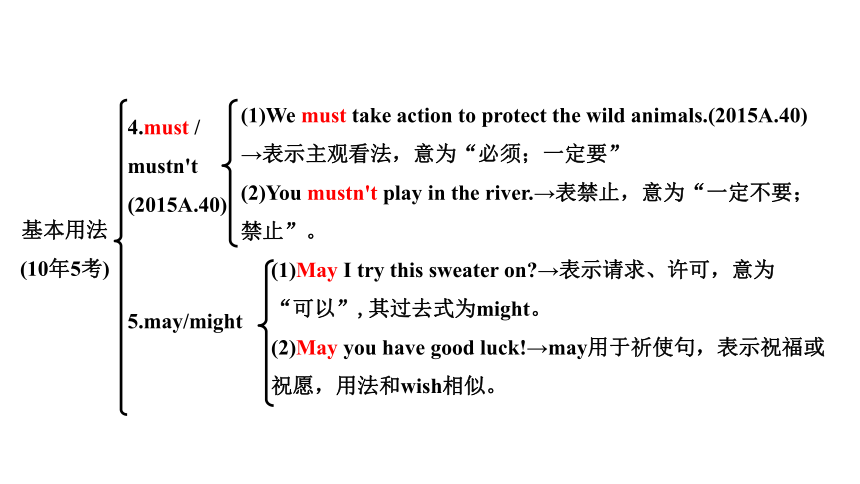
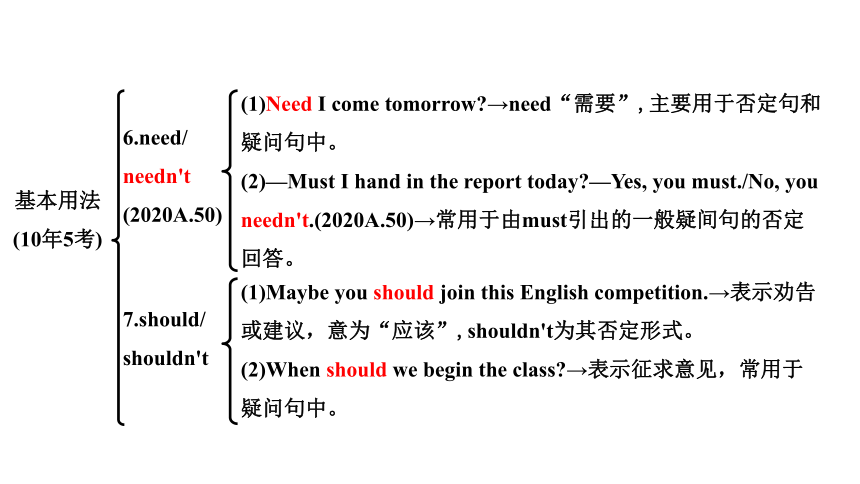
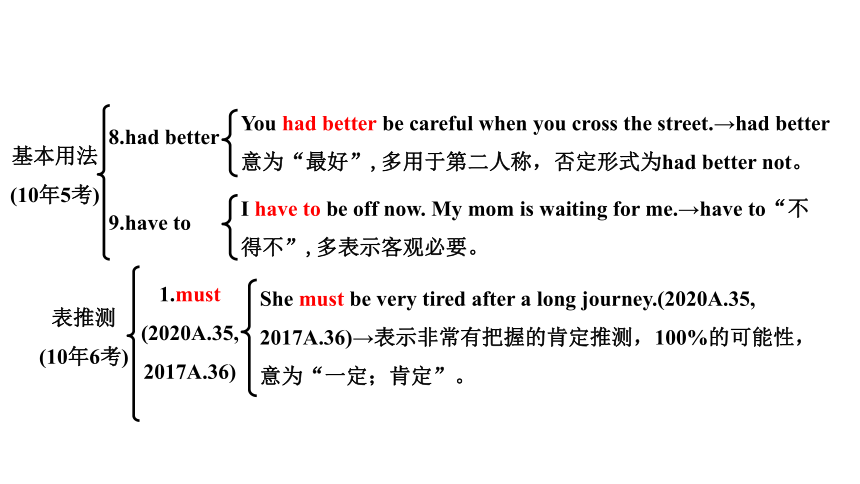
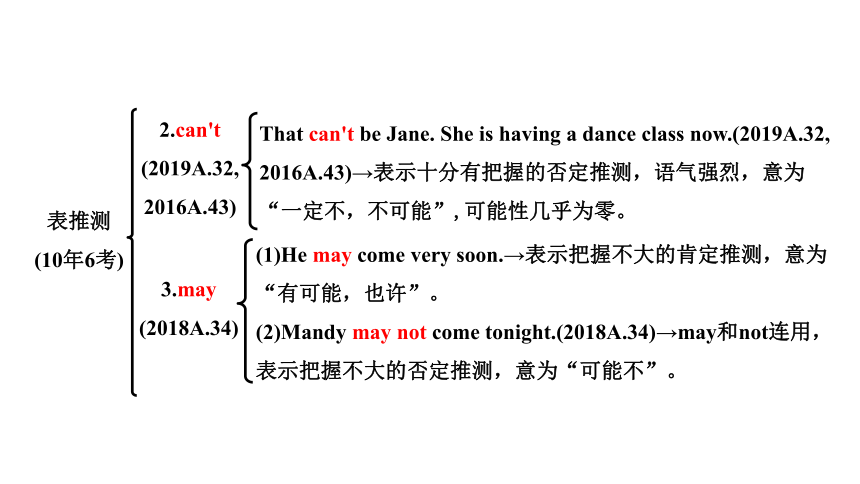
文档简介
(共20张PPT)
专 题 一
形式多变的动词
第4讲 情态动词
3
随堂检测
(10年11考,近10年连续考查;选择填空、完形填空)
2
课标知识导图
1
考情概览
考情概览
成都近10年中考在选择填空、完形填空中考查情态动词,其中情态动词的基本用法(10年5考)和表推测(10年6考)。具体考查角度如下:
1.基本用法:
选择填空(10年4考);完形填空(2020A.50);
2.表推测:
选择填空(10年6考)。
课标知识导图
情态动词(10年11考):①基本特征 ②基本用法(10年5考) ③表推测(10年6考)
基本特征
1.有词义,但不能单独作谓语,须和动词原形一起构成谓语
2.除了have to(have to→has to→had to)一般无人称和数的变化
基本用法(10年5考)
1.can(2021A.36,2014A.42)
(1)I can play basketball.(2021A.36,2014A.42)→表示能力,意为“能;会”,可与be able to相互转化。
(2)Dad, can I bring music players to school →表示请求、允许,意为“可以”。多用于口语。
基本用法(10年5考)
2.can't
(2022A.33)
(1)The little baby can't play outside by himself.(2022A.33)
→表示能力,意为“不会;不能”。
(2)—Could I take photos here —Sorry, I'm afraid you can't.→表示拒绝对方的请求或不同意;不允许,意为“不可以”。
3.could/
couldn't
(1)The clever girl could read by herself when she was three.→ can的过去式,表示过去的能力,意为“能,会”。
(2)He always helped me with the problems when I couldn't work out.→ could的否定式,意为“不能,不会”。
(3)Could you please help me with my English →在疑问句中表示委婉地请求,意为“能;可以”。
基本用法(10年5考)
4.must /
mustn't
(2015A.40)
(1)We must take action to protect the wild animals.(2015A.40)
→表示主观看法,意为“必须;一定要”
(2)You mustn't play in the river.→表禁止,意为“一定不要;禁止”。
5.may/might
(1)May I try this sweater on →表示请求、许可,意为
“可以”,其过去式为might。
(2)May you have good luck!→may用于祈使句,表示祝福或
祝愿,用法和wish相似。
基本用法(10年5考)
6.need/
needn't
(2020A.50)
(1)Need I come tomorrow →need“需要”,主要用于否定句和疑问句中。
(2)—Must I hand in the report today —Yes, you must./No, you needn't.(2020A.50)→常用于由must引出的一般疑间句的否定回答。
7.should/
shouldn't
(1)Maybe you should join this English competition.→表示劝告或建议,意为“应该”,shouldn't为其否定形式。
(2)When should we begin the class →表示征求意见,常用于疑问句中。
基本用法(10年5考)
8.had better
You had better be careful when you cross the street.→had better
意为“最好”,多用于第二人称,否定形式为had better not。
9.have to
I have to be off now. My mom is waiting for me.→have to“不得不”,多表示客观必要。
表推测(10年6考)
1.must
(2020A.35,
2017A.36)
She must be very tired after a long journey.(2020A.35,
2017A.36)→表示非常有把握的肯定推测,100%的可能性,意为“一定;肯定”。
表推测(10年6考)
2.can't
(2019A.32,2016A.43)
That can't be Jane. She is having a dance class now.(2019A.32,
2016A.43)→表示十分有把握的否定推测,语气强烈,意为“一定不,不可能”,可能性几乎为零。
3.may
(2018A.34)
(1)He may come very soon.→表示把握不大的肯定推测,意为“有可能,也许”。
(2)Mandy may not come tonight.(2018A.34)→may和not连用,表示把握不大的否定推测,意为“可能不”。
表推测(10年6考)
4. might
(2023A.34)
The story might be true.(2023A.34)→表推测,意为“有可能;也许”,might 可能性低于may,语气缓和,较委婉;和not连用,表示把握不大的否定推测,意为“可能不”。
5.could
The news could be true.→表示推测,意为“有可能,也许”
(20%~80%的可能性),语气缓和,较委婉。
6.表示肯定推测的情态动词有:must(100%)>could/may(20%~80%)>
might(按语气强弱)
表示否定推测的情态动词有:can't>may not>might not(按语气强弱)
随堂检测
基础训练
1. (2023成都A.34)Your answer _________be right, but I'm going to check to make sure.
A. can't B. might C. must
2. (2022成都A.33)—There is a new art museum in our city. You____ miss it.
—Thank you. I won't.
A. can't B. must C. needn't
B
A
3.(2021成都A.36)Life ____be easy or difficult; sometimes it depends on how you look at it.
A. can't B. must C. can
4.(2020成都A.35)—Look! People outside are wearing thick coats.
—The weather _________be very cold.
A. might B. must C. can't
5.(2019成都A.32)—Is that Tom over there?
—It __________be him. He is on the plane to Chengdu now.
A. can't B. might not C. must
C
B
A
6.(2018成都A.34)—Wow...another gift! What's in the box?
—I'm not sure. It __________be a pair of sports shoes.
A. must B. may C. will
7.(2023高新区二诊)—Look! Eric is reading a book in the library.
—It _________be him. He is playing basketball on the playground.
A. can't B. needn't C. mustn't
B
A
8. (2023锦江区二诊)—Look! Who does the book Journey to the West on the desk belong to?
—It ________Tom's book. He is a book lover of Chinese ancient classics. But I'm not sure.
A. can't be B. must be C. may be
9. —Chinese chess ____ be Mary's favorite. She almost plays it every day.
—Yes. She always says it is a hobby which can make people clever.
A. may B. can't C. must
C
C
10. —How smart the sports watch is!
—Yes, it looks small but it _________ store lots of information.
A. should B. can C. must
11. —I saw Lily walking on the playground just now.
—It ________be her. She asked for leave today.
A. can't B. might not C. must
12. —_________we go for a picnic this Saturday?
—Sure. It's a good idea.
A. Must B. May C. Shall
B
A
C
13. —What kind of person do you want to make friends with?
—Well, he _________ be clever, but he must be honest.
A. needn't B. need C. can't
14. —I think teenagers __________ talk back to their parents.
—I agree with you. We should respect them.
A. mustn't B. needn't C. shouldn't
A
C
15. A hard working man ____ become a successful man, but a successful man must be a hard working man.
A. needn't B. may not C. mustn't
16. — ___________I wait for you to come back for dinner, Mom?
— No, you don't have to. I'm going to be a little late from work today.
A. May B. Will C. Need
B
C
微语篇提能
Passage
外文素材改编自 Eyes Open
武术成就梦想
Kung Fu is a great Chinese tradition. Chinese children have the chance to go to special schools and study Kung Fu every day! After they finish their studies, the students 1 get good jobs in the army or the police force.
( )1. A. must B. may C. shall
B
Li Zheng, from Shanghai, is thirteen years old. She 2 to practise Kung Fu in the playing field every day with hundreds of other students. Every morning and evening, Li does her exercises and practices her Kung Fu moves for hours. She said she wanted to be a police officer.
( )2. A. would B. need C. may
B
The training is difficult and Li 3 live at home. She can only see her family in the holidays. Li 4 do a lot of different moves like the frog(青蛙) and the snake. She is proud of herself. She believes that her dream 5 come true one day by working hard!
( )3. A. needn't B. mustn't C. can't
( )4. A. can B. may C. must
( )5. A. should B. might C. will
C
A
C
专 题 一
形式多变的动词
第4讲 情态动词
3
随堂检测
(10年11考,近10年连续考查;选择填空、完形填空)
2
课标知识导图
1
考情概览
考情概览
成都近10年中考在选择填空、完形填空中考查情态动词,其中情态动词的基本用法(10年5考)和表推测(10年6考)。具体考查角度如下:
1.基本用法:
选择填空(10年4考);完形填空(2020A.50);
2.表推测:
选择填空(10年6考)。
课标知识导图
情态动词(10年11考):①基本特征 ②基本用法(10年5考) ③表推测(10年6考)
基本特征
1.有词义,但不能单独作谓语,须和动词原形一起构成谓语
2.除了have to(have to→has to→had to)一般无人称和数的变化
基本用法(10年5考)
1.can(2021A.36,2014A.42)
(1)I can play basketball.(2021A.36,2014A.42)→表示能力,意为“能;会”,可与be able to相互转化。
(2)Dad, can I bring music players to school →表示请求、允许,意为“可以”。多用于口语。
基本用法(10年5考)
2.can't
(2022A.33)
(1)The little baby can't play outside by himself.(2022A.33)
→表示能力,意为“不会;不能”。
(2)—Could I take photos here —Sorry, I'm afraid you can't.→表示拒绝对方的请求或不同意;不允许,意为“不可以”。
3.could/
couldn't
(1)The clever girl could read by herself when she was three.→ can的过去式,表示过去的能力,意为“能,会”。
(2)He always helped me with the problems when I couldn't work out.→ could的否定式,意为“不能,不会”。
(3)Could you please help me with my English →在疑问句中表示委婉地请求,意为“能;可以”。
基本用法(10年5考)
4.must /
mustn't
(2015A.40)
(1)We must take action to protect the wild animals.(2015A.40)
→表示主观看法,意为“必须;一定要”
(2)You mustn't play in the river.→表禁止,意为“一定不要;禁止”。
5.may/might
(1)May I try this sweater on →表示请求、许可,意为
“可以”,其过去式为might。
(2)May you have good luck!→may用于祈使句,表示祝福或
祝愿,用法和wish相似。
基本用法(10年5考)
6.need/
needn't
(2020A.50)
(1)Need I come tomorrow →need“需要”,主要用于否定句和疑问句中。
(2)—Must I hand in the report today —Yes, you must./No, you needn't.(2020A.50)→常用于由must引出的一般疑间句的否定回答。
7.should/
shouldn't
(1)Maybe you should join this English competition.→表示劝告或建议,意为“应该”,shouldn't为其否定形式。
(2)When should we begin the class →表示征求意见,常用于疑问句中。
基本用法(10年5考)
8.had better
You had better be careful when you cross the street.→had better
意为“最好”,多用于第二人称,否定形式为had better not。
9.have to
I have to be off now. My mom is waiting for me.→have to“不得不”,多表示客观必要。
表推测(10年6考)
1.must
(2020A.35,
2017A.36)
She must be very tired after a long journey.(2020A.35,
2017A.36)→表示非常有把握的肯定推测,100%的可能性,意为“一定;肯定”。
表推测(10年6考)
2.can't
(2019A.32,2016A.43)
That can't be Jane. She is having a dance class now.(2019A.32,
2016A.43)→表示十分有把握的否定推测,语气强烈,意为“一定不,不可能”,可能性几乎为零。
3.may
(2018A.34)
(1)He may come very soon.→表示把握不大的肯定推测,意为“有可能,也许”。
(2)Mandy may not come tonight.(2018A.34)→may和not连用,表示把握不大的否定推测,意为“可能不”。
表推测(10年6考)
4. might
(2023A.34)
The story might be true.(2023A.34)→表推测,意为“有可能;也许”,might 可能性低于may,语气缓和,较委婉;和not连用,表示把握不大的否定推测,意为“可能不”。
5.could
The news could be true.→表示推测,意为“有可能,也许”
(20%~80%的可能性),语气缓和,较委婉。
6.表示肯定推测的情态动词有:must(100%)>could/may(20%~80%)>
might(按语气强弱)
表示否定推测的情态动词有:can't>may not>might not(按语气强弱)
随堂检测
基础训练
1. (2023成都A.34)Your answer _________be right, but I'm going to check to make sure.
A. can't B. might C. must
2. (2022成都A.33)—There is a new art museum in our city. You____ miss it.
—Thank you. I won't.
A. can't B. must C. needn't
B
A
3.(2021成都A.36)Life ____be easy or difficult; sometimes it depends on how you look at it.
A. can't B. must C. can
4.(2020成都A.35)—Look! People outside are wearing thick coats.
—The weather _________be very cold.
A. might B. must C. can't
5.(2019成都A.32)—Is that Tom over there?
—It __________be him. He is on the plane to Chengdu now.
A. can't B. might not C. must
C
B
A
6.(2018成都A.34)—Wow...another gift! What's in the box?
—I'm not sure. It __________be a pair of sports shoes.
A. must B. may C. will
7.(2023高新区二诊)—Look! Eric is reading a book in the library.
—It _________be him. He is playing basketball on the playground.
A. can't B. needn't C. mustn't
B
A
8. (2023锦江区二诊)—Look! Who does the book Journey to the West on the desk belong to?
—It ________Tom's book. He is a book lover of Chinese ancient classics. But I'm not sure.
A. can't be B. must be C. may be
9. —Chinese chess ____ be Mary's favorite. She almost plays it every day.
—Yes. She always says it is a hobby which can make people clever.
A. may B. can't C. must
C
C
10. —How smart the sports watch is!
—Yes, it looks small but it _________ store lots of information.
A. should B. can C. must
11. —I saw Lily walking on the playground just now.
—It ________be her. She asked for leave today.
A. can't B. might not C. must
12. —_________we go for a picnic this Saturday?
—Sure. It's a good idea.
A. Must B. May C. Shall
B
A
C
13. —What kind of person do you want to make friends with?
—Well, he _________ be clever, but he must be honest.
A. needn't B. need C. can't
14. —I think teenagers __________ talk back to their parents.
—I agree with you. We should respect them.
A. mustn't B. needn't C. shouldn't
A
C
15. A hard working man ____ become a successful man, but a successful man must be a hard working man.
A. needn't B. may not C. mustn't
16. — ___________I wait for you to come back for dinner, Mom?
— No, you don't have to. I'm going to be a little late from work today.
A. May B. Will C. Need
B
C
微语篇提能
Passage
外文素材改编自 Eyes Open
武术成就梦想
Kung Fu is a great Chinese tradition. Chinese children have the chance to go to special schools and study Kung Fu every day! After they finish their studies, the students 1 get good jobs in the army or the police force.
( )1. A. must B. may C. shall
B
Li Zheng, from Shanghai, is thirteen years old. She 2 to practise Kung Fu in the playing field every day with hundreds of other students. Every morning and evening, Li does her exercises and practices her Kung Fu moves for hours. She said she wanted to be a police officer.
( )2. A. would B. need C. may
B
The training is difficult and Li 3 live at home. She can only see her family in the holidays. Li 4 do a lot of different moves like the frog(青蛙) and the snake. She is proud of herself. She believes that her dream 5 come true one day by working hard!
( )3. A. needn't B. mustn't C. can't
( )4. A. can B. may C. must
( )5. A. should B. might C. will
C
A
C
同课章节目录
- 词法
- 名词
- 动词和动词短语
- 动词语态
- 动词时态
- 助动词和情态动词
- 非谓语动词
- 冠词
- 代词
- 数词和量词
- 形容词副词及其比较等级
- 介词和介词短语
- 连词和感叹词
- 构词法
- 相似、相近词比较
- 句法
- 陈述句
- 一般疑问句和否定疑问句
- 特殊疑问句及选择疑问句
- 反意疑问句
- 存在句(There be句型)
- 宾语从句
- 定语从句
- 状语从句
- 主谓一致问题
- 简单句
- 并列句
- 复合句
- 主谓一致
- 主、表语从句
- 名词性从句
- 直接引语和间接引语
- 虚拟语气
- 感叹句
- 强调句
- 倒装句
- 祈使句
- 句子的成分
- 句子的分类
- 题型专区
- 单项选择部分
- 易错题
- 完形填空
- 阅读理解
- 词汇练习
- 听说训练
- 句型转换
- 补全对话
- 短文改错
- 翻译
- 书面表达
- 任务型阅读
- 语法填空
- 其他资料
